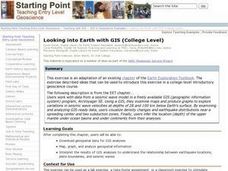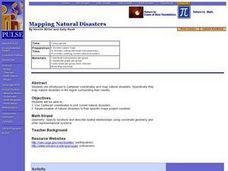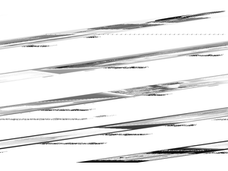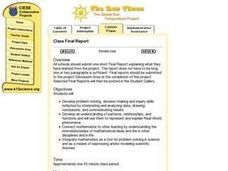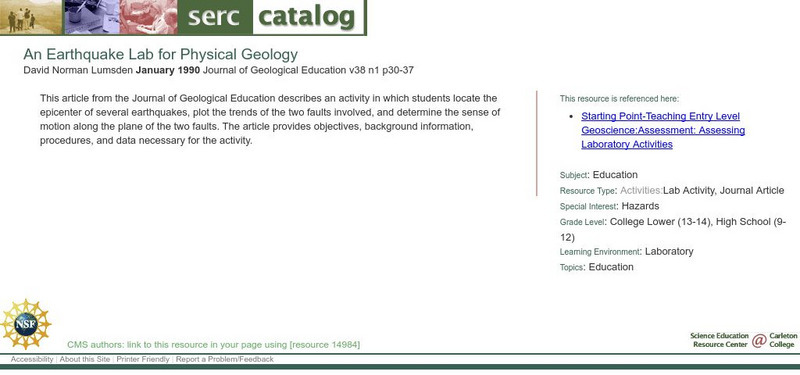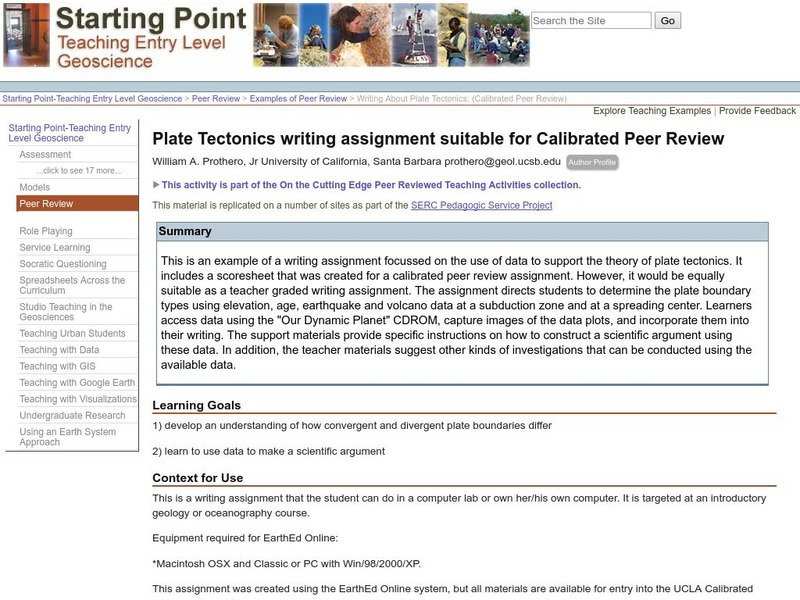Curated OER
Looking into Earth with GIS
Students work with data from a seismic wave model in a freely available GIS (geographic information system) program, ArcVoyager SE. Using a GIS, they examine maps and produce graphs to explore variations in seismic wave velocities at...
Curated OER
What in the World?
Eighth graders plot points of longitude and latitude on a world map. In groups, they create a model of the earth's interior and label the parts,
Curated OER
Mapping Natural Disasters
Pupils use Cartesian coordinates to plot current natural disasters. They relate location of natural disasters to their specific major project countries. Students tie in geometry within this lesson as connected to spatial relationships...
Curated OER
Glacial Climbing
Students plot the current distribution of glaciers around the Earth and see if there any major trends where glaciers appear to be either growing or shrinking at abnormally high rates.
Cornell University
Constructing and Visualizing Topographic Profiles
Militaries throughout history have used topography information to plan strategies, yet many pupils today don't understand it. Scholars use Legos and a contour gauge to understand how to construct and visualize topographic profiles. This...
Curated OER
The Tell-Tale Plume
Students examine hydrothermal vents. In this ocean lesson, students identify changes in physical and chemical properties of sea water caused by hydrothermal vents.
Curated OER
Class Final Report - Global Sun Temperature Project
Students reflect on the data they have analyzed during the Global Sun Temperature Project. They use the project website as a resource for their observations, draft a class report and post it on the Internet.
Curated OER
Geography and Architecture
Pupils discuss how terrain and climate affect the design of houses and commercial structures and thus influence the way architects design buildings in this elementary lesson plan.
Curated OER
States with Attitude, Latitude and Longitude Dude
Sixth graders identify states whose boundaries are formed by lines of latitude and longitude or natural borders such as rivers. They trace a map of the U.S., and fill in borders, rivers and lines of latitude and longitude.
Science Education Resource Center at Carleton College
Serc: Plotting Earthquakes With Near Real Time Data
This lesson teaches the concept of plate tectonics. Students will access the United States Geological Survey National Earthquake Information Center and plot the longitude latitude and depth of earthquakes on a physiographic chart.
Science Education Resource Center at Carleton College
Serc: An Earthquake Lab for Physical Geology
This article from the Journal of Geological Education describes an activity in which students locate the epicenter of several earthquakes, plot the trends of the two faults involved, and determine the sense of motion along the plane of...
Science Education Resource Center at Carleton College
Serc: Writing About Plate Tectonics
This lesson plan is a writing assignment focussed on the use of data to support the theory of plate tectonics. It includes a scoresheet that was created for a calibrated peer review assignment. The assignment directs students to...


